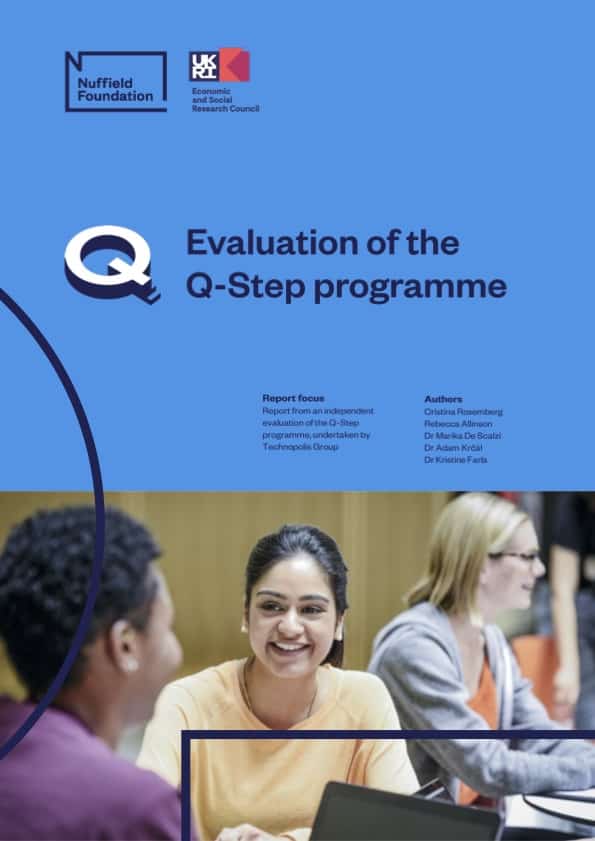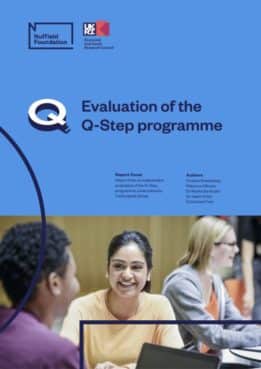Evaluation of the Q-Step programme
Erscheinungsdatum: 11 Mai 2022 | Sprache der Studie: EN
This report presents the results of the Q-Step programme evaluation. Q-Step is a £19.5 million programme launched in 2013/14 and funded by the Nuffield Foundation, Economic and Social Research Council (ESRC) and the Higher Education Funding Council for England (HEFCE). Q-Step funded a total of 18 Higher Education Institutions (HEIs) (the Q-Step Centres) for five years (until 2018) and provided additional ‘transitional’ funding to 17 of them, for two years (2019–2021).
- Q-Step was developed as a strategic response to the shortage of quantitatively skilled social science
- graduates in the UK and was designed to promote a step-change in quantitative social science training through the development of exemplar provision. It aimed to have a direct impact on:
- HEIs – the programme set out to generate sustainable institutional change in the HEIs hosting QStep Centres, supporting an increase in the critical mass of quantitatively skilled social scientists in UK universities (with associated benefits to academic research) throughout and beyond the initial five-year funding period
- Students taking the Q-Step programmes and/or modules – supporting students in their career trajectories by developing quantitative methods skills applied to the social sciences.
- Employers hosting Q-Step placement students and employing Q-Step alumni – meeting the needs of the wider labour market by equipping social science students with relevant skills to increase productivity and innovation in the workplace.
Equally importantly, the initiative was designed to “signal to a wide range of stakeholders that the stress on quantitative training and the role of empirical evidence in the social sciences requires a structural shift across the educational life course” (Programme Background paper, 2013). The Q-Step programme was “experimental”, and “evolutionary and permissive”, allowing time and scope for Centres to decide how best to implement the programme and encouraging flexibility and creativity through the process.
The aim of the evaluation
The overall aim of the evaluation was to assess whether the Q-Step programme met its intended objectives and, given its experimental nature, whether evidence suggests it was successful as a proof of concept. Based on these findings, the evaluation provides recommendations to inform future development and similar future initiatives.
Evaluation approach
This evaluation is guided by a Theory of Change that captures the intended effects of the programme across the three beneficiary groups: the HEIs (Q-Step Centres), students and employers. It is based on desk research and intensive consultation with institutional and programme leaders at the Centres, lecturers, students and alumni. Evidence was collected at three points in time, in 2018, 2019 and 2020, to provide an evolutionary perspective of the programme. The evaluation also includes an econometric analysis to further explore the impact of the programme on students. The following sections summarise our assessment of the Q-Step programme’s implementation, impacts on the three specific intended groups, findings for sustainability and scalability, and, finally, our recommendations for the programme going forward.
This evaluation of Q-Step demonstrates the success of the programme in promoting “a step-change in quantitative social science education and training in the UK”. The Q-Step programme is helping to address the increasing application of quantitative methods in both research and professional settings as large data sets become more available and useful for a wide range of sectors (for private companies, public organisations and charities). This is evidenced in the literature and through interviews with lecturers and employers.
Q-Step provides a successful proof of concept for increasing the number of quantitatively skilled social scientists. A total of 1,101 students are estimated to have taken up a Q-Step degree programme in 2019/20, a fivefold increase in comparison with 2014/15. 11,171 students took up Q-Step modules in 2019/20, up from 8,813 in 2015/16 – a 27 per cent increase (based on data available from HESA).
To achieve a critical mass of quantitatively skilled social scientists, more universities would need to embed a Q-Step approach (2019/2020 HESA student statistics show around 164,000 undergraduate students enrolled in social sciences in total). This goes beyond what a single programme can achieve and would require system-wide change and potentially national policy levers.
The evaluation investigated the extent to which the different delivery models implemented across the range of Q-Step Centres could be classified or clustered into a set of models. The evidence collected shows there is no single model for Q-Step Centres. The approaches taken to implementation have been guided by the universities’ own processes, culture, and decision-making procedures. The approaches have also been adapted over time with a general trend towards deeper integration of QStep within the schools and faculties. This includes increased discipline-specific modularity; a shift from first to second year recruitment; and a broadened student discipline base (from the social sciences).
The evaluation also identified success factors that support the implementation of the programme: strong internal coordination and continuity of staff, leadership support, investment to support staff, and alignment of the programme goals with institutional objectives. Recruiting prospective students for full degree pathways has proved challenging. Most Centres find that combining both full degree pathways and modules is the most effective way to recruit students. For the programme delivery, new pedagogical approaches have been adopted and adapted. Key features of the Q-Step teaching approach are the inclusion of practical sessions to implement concepts/approaches learned in the theory sessions and the use of real-world examples, as well as small class sizes. These are all identified as factors that support effective learning.
Work placements are a successful part of the Q-Step approach. There is a growing trend towards creditbearing work placements being introduced within the programme (with success), and lecturers and students state that the work placements have allowed students the opportunity to apply quantitative methods in a real enviroment.
All Q-Step Centres also provide support through additional activities to further enhance the student experience and learning. These activities are varied but align with Q-Step core activities (the curricula, access to the programme, work placements etc.), and coordinators and lecturers underlined these additional “student-centred” activities as important for bringing the Q-Step student community together.
These activities have been challenging to sustain during COVID-19.
Q-Step Centres’ promotional activities have increased in intensity over time and have become more effective at targeting the intended audiences (including parents and prospective students). These are viewed by lecturers and students as important for the achievement of the objective of the Q-Step programme. There is also evidence of successful outreach activities, targeted at communities outside the Centre and host intitutions (e.g. secondary school students), which have further supported the development of quantitative skills (e.g. The University of Edinburgh’s Q-Step Academy).
Cross-Centre activities have been important for the Q-Step Centres, but there have been more limited opportunities than expected. They provide a space for learning, motivation and networking and are valued by the Centres.
Read the full report by clicking the image in the top right corner.


